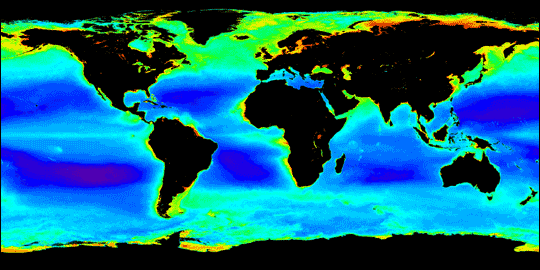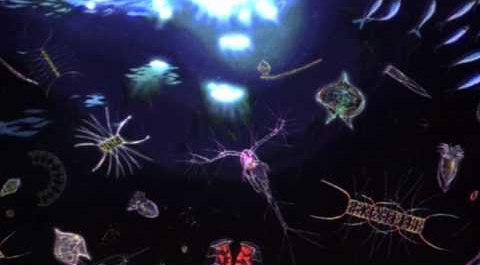File:Phytoplankton - the foundation of the oceanic food chain 560x396.jpg: Difference between revisions
Siterunner (talk | contribs) No edit summary |
Siterunner (talk | contribs) No edit summary |
||
| Line 1: | Line 1: | ||
[http://www.motherjones.com/blue-marble/2010/10/discovery-marine-ecotone&layout=button_count&show_faces=false&width=95px&action=like&font=verdana&colorscheme=light&height=21%3bfloat:right%3b Discovery of a Marine Ecotone] | <big>'''The Air We Breathe'''</big> | ||
::'''''"A single kind of blue-green algae in the ocean produces the oxygen in one of every five breaths we take"''''' | |||
:: ''~ from "The World Is Blue: How Our Fate and the Ocean’s Are One" by Sylvia Earle'' | |||
Phytoplankton are responsible for much of the oxygen present in the Earth’s atmosphere and most of the total amount produced by all plant life. | |||
<big>'''Earth's Oxygen & the Oceans' Food Chain '''</big> | |||
• https://commons.wikimedia.org/wiki/File:Phytoplankton_-_the_foundation_of_the_oceanic_food_chain.jpg | |||
[http://www.motherjones.com/blue-marble/2010/10/discovery-marine-ecotone&layout=button_count&show_faces=false&width=95px&action=like&font=verdana&colorscheme=light&height=21%3bfloat:right%3b Discovery of a Marine Ecotone] | |||
• http://plankt.oxfordjournals.org/content/30/2/107.full | |||
'''Big Trouble Ahead for Ocean's Microbes''' | '''Big Trouble Ahead for Ocean's Microbes''' | ||
'''Phytoplankton are the foundation of the oceanic food chain''' | •http://grist.org/news/big-trouble-ahead-for-oceans-tiny-microbes/ | ||
http://en.wikipedia.org/wiki/Phytoplankton | |||
'''Phytoplankton - Algae - Diatoms are the foundation of the oceanic food chain''' | |||
• http://en.wikipedia.org/wiki/Phytoplankton | |||
• https://en.wikipedia.org/wiki/Diatom | |||
'''The Food Chain's Weak Link: Tiny Ocean Plants Dying''' | '''The Food Chain's Weak Link: Tiny Ocean Plants Dying''' | ||
<big><font color=blue> | • http://www.npr.org/templates/story/story.php?storyId=128823662 | ||
<big><font color=blue>○ ○ ○ ○ ○ ○ ○ ○ ○ ○ ○ ○ ○ ○ ○ ○ ○ ○</font></big> <big><font color=green>○ ○ ○ ○ ○ ○ ○ ○ ○ ○ ○ ○ ○ ○ ○ ○ ○</font></big> | |||
'''Enormous Plankton database''' -- May 2015 | '''Enormous Plankton database''' -- May 2015 | ||
http://www.bbc.com/news/science-environment-32831814 | |||
• http://www.bbc.com/news/science-environment-32831814 | |||
Dr Bowler: "It is temperature that determines what sort of communities of organisms we find. If we look at our data and we see what organisms are there, we can predict with 97% probability the temperature of the water they are living in. | Dr Bowler: "It is temperature that determines what sort of communities of organisms we find. If we look at our data and we see what organisms are there, we can predict with 97% probability the temperature of the water they are living in. | ||
| Line 30: | Line 53: | ||
[[File:Phyto glowing beauty of the oceans.jpg]] | [[File:Phyto glowing beauty of the oceans.jpg]] | ||
<big><font color=blue>○ ○ ○ ○ ○ ○ ○ ○ ○ ○ ○ ○ ○ ○ ○ ○ ○ ○</font></big> <big><font color=green>○ ○ ○ ○ ○ ○ ○ ○ ○ ○ ○ ○ ○ ○ ○ ○ ○</font></big> | <big><font color=blue>○ ○ ○ ○ ○ ○ ○ ○ ○ ○ ○ ○ ○ ○ ○ ○ ○ ○</font></big> <big><font color=green>○ ○ ○ ○ ○ ○ ○ ○ ○ ○ ○ ○ ○ ○ ○ ○ ○</font></big> | ||
<big><big>'''"The Tiny Little Ones - Plankton"'''</big></big> | |||
:: ''"The forests of the oceans" the "grass of the seas"'' | |||
<big> | |||
<big>'''"The Tiny Little Ones - Plankton"'''</big> | |||
:: ''"The | |||
''It is estimated that marine plants produce between 70 and 80 percent of the oxygen in the atmosphere. Nearly all marine plants are single celled, photosynthetic plankton-algae...'' | ''It is estimated that marine plants produce between 70 and 80 percent of the oxygen in the atmosphere. Nearly all marine plants are single celled, photosynthetic plankton-algae...'' | ||
| Line 51: | Line 69: | ||
[http://www.ecology.com/2011/09/12/important-organism/ '''Marine Algae: The Most Important Organism?'''] | [http://www.ecology.com/2011/09/12/important-organism/ '''Marine Algae: The Most Important Organism?'''] | ||
''It is estimated that marine plants produce between 70 and 80 percent of the oxygen in the atmosphere... Nearly all marine plants are single celled, photosynthetic algae... Even marine seaweed is, many times, colonial algae. They are a bunch of single cells trying to look like a big plant ('seaweed' - [http://www.montereybayaquarium.org/animal-guide/plants-and-algae/giant-kelp kelp])... Think about it, 70 percent to 80 percent of all the oxygen we breathe... Why does so much of our oxygen come from algae? First of all, remember that the oceans cover about 71 percent of this planet and land is only about 29 percent... Overall, the production of oxygen in the oceans is at least equal to the production on land'' | ''It is estimated that marine plants produce over 50 percent and up to between 70 and 80 percent of the oxygen in the atmosphere... Nearly all marine plants are single celled, photosynthetic algae... Even marine seaweed is, many times, colonial algae. They are a bunch of single cells trying to look like a big plant ('seaweed' - [http://www.montereybayaquarium.org/animal-guide/plants-and-algae/giant-kelp kelp])... Think about it, 70 percent to 80 percent of all the oxygen we breathe... Why does so much of our oxygen come from algae? First of all, remember that the oceans cover about 71 percent of this planet and land is only about 29 percent... Overall, the production of oxygen in the oceans is at least equal to the production on land'' | ||
[http://en.wikipedia.org/wiki/Phytoplankton -- Phytoplankton] obtain energy through the process of photosynthesis and must therefore live in the well-lit surface layer (termed the euphotic zone) of an ocean, sea, lake, or other body of water. '''Phytoplankton account for half of all photosynthetic activity on Earth'''. | [http://en.wikipedia.org/wiki/Phytoplankton -- Phytoplankton] obtain energy through the process of photosynthesis and must therefore live in the well-lit surface layer (termed the euphotic zone) of an ocean, sea, lake, or other body of water. '''Phytoplankton account for half of all photosynthetic activity on Earth'''. | ||
○ | ○ | ||
<big>'''Tiny Blue Green'''</big> | <big>'''Tiny Blue Green'''</big> | ||
| Line 63: | Line 81: | ||
[http://www.tinybluegreen.com www.tinybluegreen.com] | [http://www.tinybluegreen.com www.tinybluegreen.com] | ||
http://www.greenpolicy360.net/w/File:Phytoplankton.jpg | • http://www.greenpolicy360.net/w/File:Phytoplankton.jpg | ||
http://www.greenpolicy360.net/w/File:Phyto_glowing_beauty_of_the_oceans.jpg | • http://www.greenpolicy360.net/w/File:Phyto_glowing_beauty_of_the_oceans.jpg | ||
Revision as of 14:10, 10 February 2019
The Air We Breathe
- "A single kind of blue-green algae in the ocean produces the oxygen in one of every five breaths we take"
- ~ from "The World Is Blue: How Our Fate and the Ocean’s Are One" by Sylvia Earle
Phytoplankton are responsible for much of the oxygen present in the Earth’s atmosphere and most of the total amount produced by all plant life.
Earth's Oxygen & the Oceans' Food Chain
• https://commons.wikimedia.org/wiki/File:Phytoplankton_-_the_foundation_of_the_oceanic_food_chain.jpg
• http://plankt.oxfordjournals.org/content/30/2/107.full
Big Trouble Ahead for Ocean's Microbes
•http://grist.org/news/big-trouble-ahead-for-oceans-tiny-microbes/
Phytoplankton - Algae - Diatoms are the foundation of the oceanic food chain
• http://en.wikipedia.org/wiki/Phytoplankton
• https://en.wikipedia.org/wiki/Diatom
The Food Chain's Weak Link: Tiny Ocean Plants Dying
• http://www.npr.org/templates/story/story.php?storyId=128823662
○ ○ ○ ○ ○ ○ ○ ○ ○ ○ ○ ○ ○ ○ ○ ○ ○ ○ ○ ○ ○ ○ ○ ○ ○ ○ ○ ○ ○ ○ ○ ○ ○ ○ ○
Enormous Plankton database -- May 2015
• http://www.bbc.com/news/science-environment-32831814
Dr Bowler: "It is temperature that determines what sort of communities of organisms we find. If we look at our data and we see what organisms are there, we can predict with 97% probability the temperature of the water they are living in.
"These organisms are most sensitive to temperature, more than anything else, and with changing temperatures as a result of climate change we are likely to see changes in this community."
The researchers say that this scientific analysis is just the beginning. They are making their findings freely available to the scientific community to gain a better understanding of this vital but unseen underwater world.
○ ○ ○ ○ ○ ○ ○ ○ ○ ○ ○ ○ ○ ○ ○ ○ ○ ○ ○ ○ ○ ○ ○ ○ ○ ○ ○ ○ ○ ○ ○ ○ ○ ○ ○
"The Tiny Little Ones - Plankton"
- "The forests of the oceans" the "grass of the seas"
It is estimated that marine plants produce between 70 and 80 percent of the oxygen in the atmosphere. Nearly all marine plants are single celled, photosynthetic plankton-algae...
National Geo for Students: Save the Plankton
- Students calculate how many of the breaths they take each day come from the (blue-green algae) phytoplankton, Prochlorococcus
Marine Algae: The Most Important Organism?
It is estimated that marine plants produce over 50 percent and up to between 70 and 80 percent of the oxygen in the atmosphere... Nearly all marine plants are single celled, photosynthetic algae... Even marine seaweed is, many times, colonial algae. They are a bunch of single cells trying to look like a big plant ('seaweed' - kelp)... Think about it, 70 percent to 80 percent of all the oxygen we breathe... Why does so much of our oxygen come from algae? First of all, remember that the oceans cover about 71 percent of this planet and land is only about 29 percent... Overall, the production of oxygen in the oceans is at least equal to the production on land
-- Phytoplankton obtain energy through the process of photosynthesis and must therefore live in the well-lit surface layer (termed the euphotic zone) of an ocean, sea, lake, or other body of water. Phytoplankton account for half of all photosynthetic activity on Earth.
○
Tiny Blue Green
• http://www.greenpolicy360.net/w/File:Phytoplankton.jpg
• http://www.greenpolicy360.net/w/File:Phyto_glowing_beauty_of_the_oceans.jpg
○ ○ ○ ○ ○ ○ ○ ○ ○ ○ ○ ○ ○ ○ ○ ○ ○ ○ ○ ○ ○ ○ ○ ○ ○ ○ ○ ○ ○ ○ ○ ○ ○ ○
File history
Click on a date/time to view the file as it appeared at that time.
| Date/Time | Thumbnail | Dimensions | User | Comment | |
|---|---|---|---|---|---|
| current | 14:09, 14 February 2016 |  | 560 × 396 (101 KB) | Siterunner (talk | contribs) | <big>'''Food Chain & Oxygen'''</big> https://commons.wikimedia.org/wiki/File:Phytoplankton_-_the_foundation_of_the_oceanic_food_chain.jpg [http://www.motherjones.com/blue-marble/2010/10/discovery-marine-ecotone&layout=button_count&show_faces=false&wi... |
You cannot overwrite this file.
File usage
The following 13 pages use this file:
- All Species Day
- GreenPolicy360 Archive Highlights 2018
- It's All Related
- Planet API
- File:Chlorophyll in the oceans and vegetation on land world map 2003 NASA-Goddard.jpg
- File:Cyanobacteria Prochlorococcus worldmapping MIT.jpg
- File:Earth in Human Hands.jpg
- File:Phytoplankton - the foundation of the oceanic food chain.jpg
- File:Phytoplankton - the foundation of the oceanic food chain m.jpg
- File:Plankton Phytoplankton--'Climate Dance'.jpg
- File:Watching the Planet Breathe3.jpg
- Category:About Us
- Category:Ocean Science

